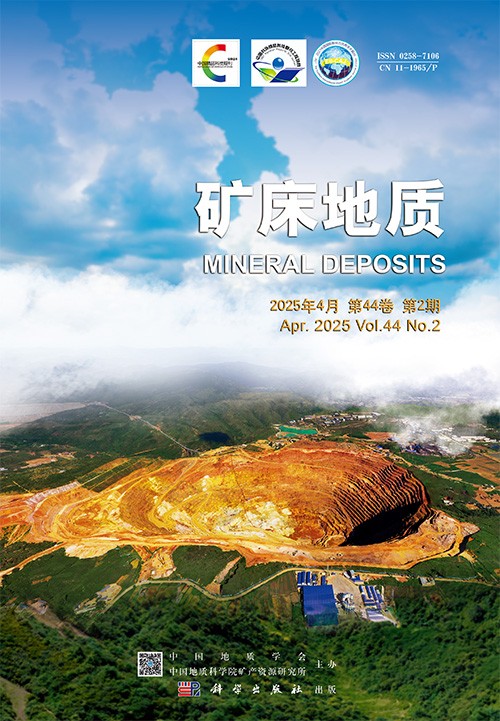摘要点击排行前10名
全文下载排行前10名
超大型矿床成矿模式与定位预测专栏
- 初论矿床动态技术经济评价 [455]
陈景河,王京彬,刘金辉,和志军 - [摘要] [HTML] [PDF]
- 斑岩铜多金属成矿系统定位预测 [447]
王京彬,王玉往,林寿洪,龙灵利,耿健 - [摘要] [HTML] [PDF]
- 义兴寨金矿床斑岩成矿系统特征与矿体定位规律 [294]
张会琼,王玉往,孙荣良,杨卫立,陈昱 - [摘要] [HTML] [PDF]
- 刚果(金)马诺诺超大型锂矿床成矿特征与勘查准则 [256]
阙朝阳,李红兵,解洪晶,刘建明,李顺庭,雷德利 - [摘要] [HTML] [PDF]
- 阿根廷Tres Quebradas盐湖锂矿地质特征及资源评价 [220]
张汉成,刘金辉,李顺庭,张顺金,林寿洪,黄志立,郑元平,张世东,陈威,陈建平,孟军辉,王小飞 - [摘要] [HTML] [PDF]
- 贵州省水银洞金矿床茅口组方解石地球化学特征及指示意义 [271]
李德东,王玉往,张会琼,解洪晶,陈昱,龙灵利,耿健,王琦睿 - [摘要] [HTML] [PDF]
- 南美州圭亚那地盾北部奥罗拉金矿床地质特征及找矿预测 [232]
张俊杨,单思齐,傅其斌,刘洋树,吴炳生,王勤,刘晗,李永辉,祝新友 - [摘要] [HTML] [PDF]
非主题来稿
- 碳酸岩成岩成矿作用熔体包裹体研究进展综述 [290]
白杨,宋文磊,杨金昆,许丹妮,宋来阳,徐扬 - [摘要] [HTML] [PDF]
- 镇旬盆地南缘淋湘金矿床流体来源及其成因探讨:C-H-O-Fe同位素、磷灰石裂变径迹的证据 [210]
薛仲凯,范堡程,李航,高永宝,魏立勇,马承 - [摘要] [HTML] [PDF]
- 甘肃白银厂铜多金属矿田矿床成因及成矿模式研究进展综述 [343]
郭小刚,戴霜,韩峰,苟瑞,王秦,李正华 - [摘要] [HTML] [PDF]
- 赣南高山角斑岩型钨钼矿化新发现与找矿潜力分析 [251]
陶建利,周瑶,郭德银,赵正,王旭,尹积扬 - [摘要] [HTML] [PDF]
- 滇东北宣威组Fe-Al岩系中稀土-钪的赋存规律及物质来源 [247]
王琪,黄小文,周美夫,孔志岗,杨志爽,孟郁苗,漆亮 - [摘要] [HTML] [PDF]
- 新疆阿吾拉勒成矿带塔尔塔格铁矿床的地质特征、形成时代及其找矿意义 [248]
张永乐,欧阳荷根,蒋宗胜,孙强,杨燕 - [摘要] [HTML] [PDF]

ISSN0258-7106,CN11-1965/P
1982年创刊 双月刊
您是第248243929位访问者 京ICP备05032737号-5 京公网 安备110102004559
主管单位:中国科学技术协会 主办单位:中国地质学会矿床地质专业委员会 中国地质科学院矿产资源研究所
地 址: 北京市百万庄大街26号 邮编:100037 电话:010-68327284;010-68999546 E-mail: minerald@vip.163.com
本系统由北京勤云科技发展有限公司设计
主管单位:中国科学技术协会 主办单位:中国地质学会矿床地质专业委员会 中国地质科学院矿产资源研究所
地 址: 北京市百万庄大街26号 邮编:100037 电话:010-68327284;010-68999546 E-mail: minerald@vip.163.com
本系统由北京勤云科技发展有限公司设计
手机扫一扫





